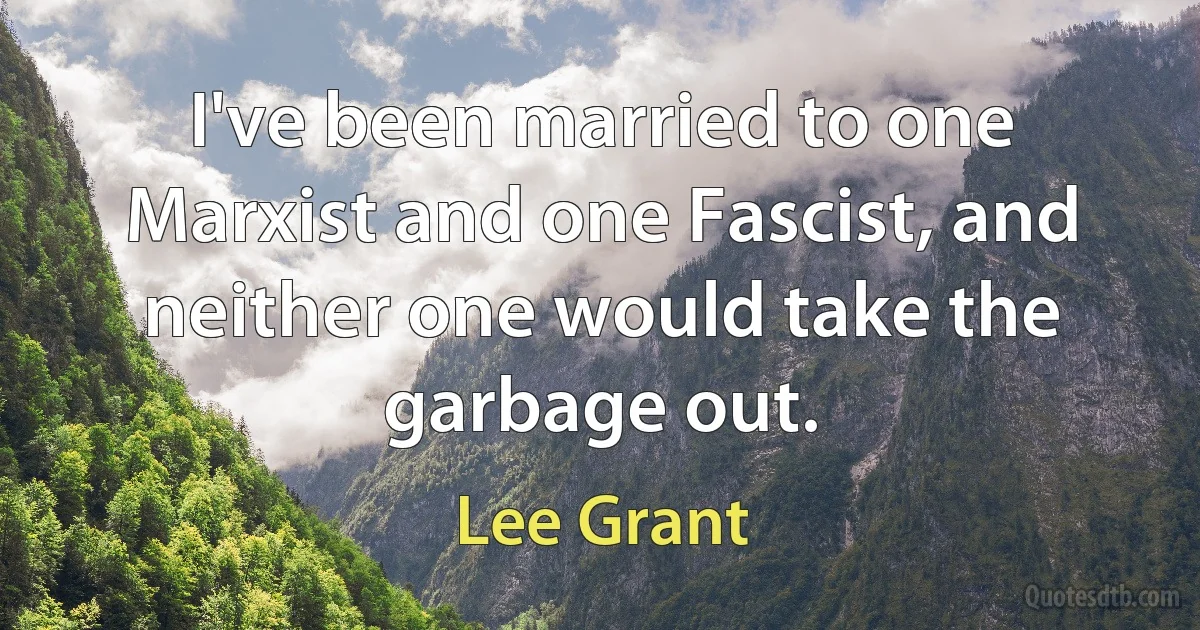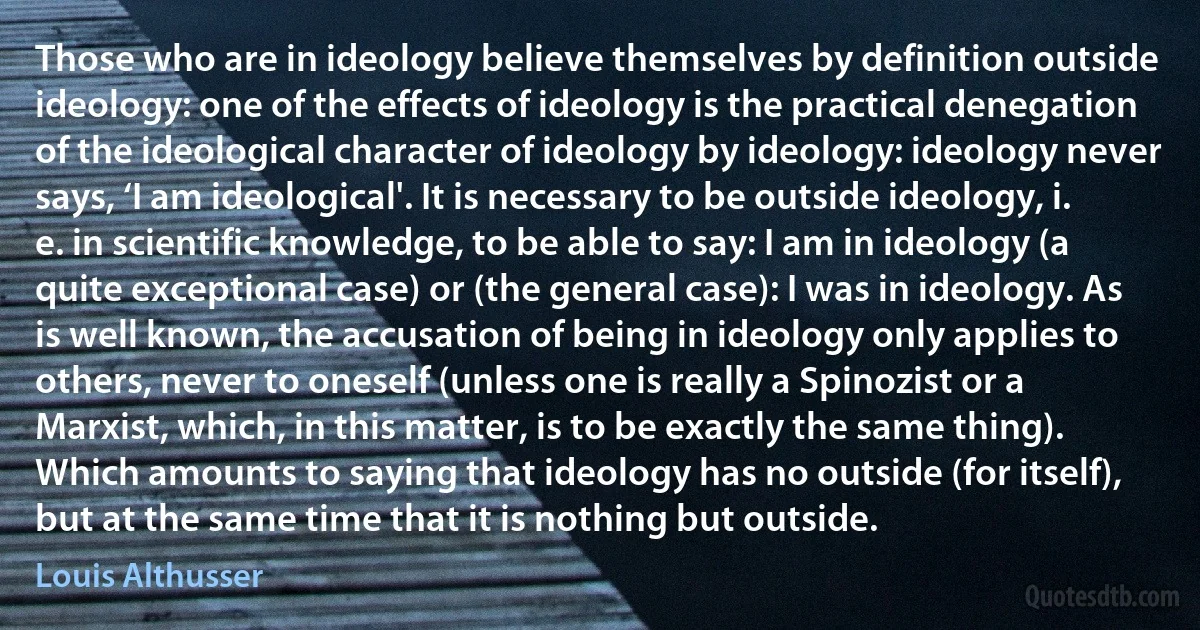Marxist Quotes - page 2
The early thirties brought what liberal economists called the Great Depression and Marxist economists described as the great crisis of capitalism. It dawned on me that the economic world order was unreliable, unstable, and, most of all, iniquitous. I sought intellectual contacts and friendship with a group of socialist students and also with a small handful of communist-oriented students and unemployed workers.

Tjalling Koopmans
Marxist schools have authors. Just as Marxism sprang from the mind of Marx, so we have Leninists, Maoists, Trotksyites, Gramscians, Althusserians... (Note how the list starts with heads of state and grades almost seamlessly into French professors.) ... Now consider the different schools of anarchism. There are Anarcho-Syndicalists, AnarchoCommunists, Insurrectionists, Cooperativists, Individualists, Platformists... None are named after some Great Thinker; instead, they are invariably named either after some kind of practice, or most often, organizational principle. (Significantly, those Marxist tendencies which are not named after individuals, like Autonomism or Council Communism, are also the ones closest to anarchism.) Anarchists like to distinguish themselves by what they do, and how they organize themselves to go about doing it.

David Graeber
The faction fight in the Socialist Workers Party, its conclusion, and the recent formation of the Workers Party have been in my own case, the unavoidable occasion for the review of my own theoretical and political beliefs. This review has shown me that by no stretching of terminology can I regard myself, or permit others to regard me, as a Marxist.

James Burnham
Nevertheless. among all the temptations I will have to resist today. There would be the temptation of memory: to recount what was for me. and for those of my generation who shared it during a whole lifetime. The experience of Marxism. The quasi-paternal figure of Marx, the way it fought in us with other filiations, the reading of texts and the interpretation of a world in which the Marxist inheritance was-and still remains, and so it will remain-absolutely and thoroughly determinate. One need not be a Marxist or a communist in order to accept this obvious fact. We all live in a world, some would say a culture, that still bears, at an incalculable depth, the mark of this inheritance, whether in a directly visible fashion or not.

Jacques Derrida
Economists, like everyone, have their political biases, but these are by no means as strong an influence on what they are willing to consider as you might think. For example, one might have thought that strongly liberal economists like, say, James Tobin would be at least mildly sympathetic to the views of radical economists who draw their inspiration from Marx, or of heterodox economic thinkers like Galbraith. After all, in such fields as history and sociology the Marxist or post-Marxist left has long received a respectful hearing. And yet you don't find this happening: liberal economists are almost as quick as their conservative colleagues to condemn heterodox leftist ideas as foolish it was the liberal Robert Solow, not Milton Friedman, who defended orthodoxy in the bitter "capital controversy" with British radicals.

Paul Krugman
Rosa Luxemburg is an outstanding example of a type of mind that is often met with in the history of Marxism and appears to be specially attracted by the Marxist outlook. It is characterized by slavish submission to authority, together with a belief that in that submission the values of scientific thought can be preserved. No doctrine was so well suited as Marxism to satisfy both these attitudes, or to provide a mystification combining extreme dogmatism with the cult of "scientific” thinking, in which the disciple could find mental and spiritual peace. Marxism thus played the part of a religion for the intelligentsia, which did not prevent some of them, like Rosa Luxemburg herself, from trying to improve the deposit of faith by reverting to first principles, thus strengthening their own belief that they were independent of dogma. (pp. 94-5)

Leszek Kołakowski
Fascism is a religion of the state. It assumes the organic unity of the body politic and longs for a national leader attuned to the will of the people. It is totalitarian in that it views everything as political and holds that any action by the state is justified to achieve the common goal. It takes responsibility for all aspects of life, including our health and well-being, and seeks to impose uniformity of thought and action, whether by force or through regulation and social pressure. Everything, including economy and religion, must be aligned with its objectives. Any rival identity is part of the "problem" and therefore defined as the enemy. I will argue that contemporary American liberalism embodies all of these aspects of fascism... You can see why the Marxist left would resist the idea that Hitler was a revolutionary. Because if he was, then either Hitler was a force for good, or revolutions can be bad.

Jonah Goldberg
But someone is bound to question ... by what right I regard as Ideological State Apparatuses, institutions which for the most part do not possess public status, but are quite simply private institutions. As a conscious Marxist, Gramsci already forestalled this objection in one sentence. The distinction between the public and the private is a distinction internal to bourgeois law, and valid in the (subordinate) domains in which bourgeois law exercises its ‘authority'. The domain of the State escapes it because the latter is ‘above the law': the State, which is the State of the ruling class, is neither public nor private; on the contrary, it is the precondition for any distinction between public and private. The same thing can be said from the starting-point of our State Ideological Apparatuses. It is unimportant whether the institutions in which they are realized are ‘public' or ‘private'. What matters is how they function.

Louis Althusser
Liberal democracy - as you know, in the old days, we were saying we want socialism with a human face. Today's left effectively offers global capitalism with a human face, more tolerance, more rights and so on. So the question is, is this enough or not? Here I remain a Marxist: I think not.

Slavoj Žižek
What has been shown by Machiavelli, who is often (like Nietzsche) congratulated for tearing off hypocritical masks, brutally revealing the truth, and so on, is not that men profess one thing and do another (although no doubt he shows this too) but that when they assume that the two ideals are compatible, or perhaps are even one and the same ideal, and do not allow this assumption to be questioned, they are guilty of bad faith (as the existentialists call it, or of "false consciousness,” to use a Marxist formula) which their actual behavior exhibits. Machiavelli calls the bluff not just of official morality-the hypocrisies of ordinary life-but of one of the foundations of the central Western philosophical tradition, the belief in the ultimate compatibility of all genuine values. His own withers are unwrung. He has made his choice. He seems wholly unworried by, indeed scarcely aware of, parting company with traditional Western morality.

Isaiah Berlin
Washington knows no heresy in the Third World but independence. In the case of Salvador Allende independence came clothed in an especially provocative costume-a Marxist constitutionally elected who continued to honor the constitution. This would not do. It shook the very foundation stones upon which the anti-communist tower is built: the doctrine, painstakingly cultivated for decades, that "communists" can take power only through force and deception, that they can retain that power only through terrorizing and brainwashing the population. There could be only one thing worse than a Marxist in power-an elected Marxist in power.

William Blum
In the past fifteen years, Marxist approaches towards literature have enjoyed increasing vogue. To be conscious of the social context of art seems to automatically entail a leftist orientation. But a theory is possible that is both avant-garde and capitalist. Marxism was one of Rousseau's nineteenth-century progeny, energized by faith in the perfectabilty of man. Its belief that economic forces are the primary dynamic force in history is Romantic naturism in disguise. ... Marxism is the bleakest of anxiety-formations against the power of cthonian mothers.

Camille Paglia
The old "double standard” gave men a sexual liberty denied to women. Marxist feminists reduced the historical cult of woman's virginity to her property value, her worth on the male marriage market. I would argue instead that there was and is a biological basis to the double standard. The first medical reports on the disease killing male homosexuals [i.e., AIDS] indicated men most at risk were those with a thousand partners over their lifetime. Incredulity. Who could such people be? Why, it turns out, everyone one knew. Serious, kind, literate men, not bums or thugs.

Camille Paglia



